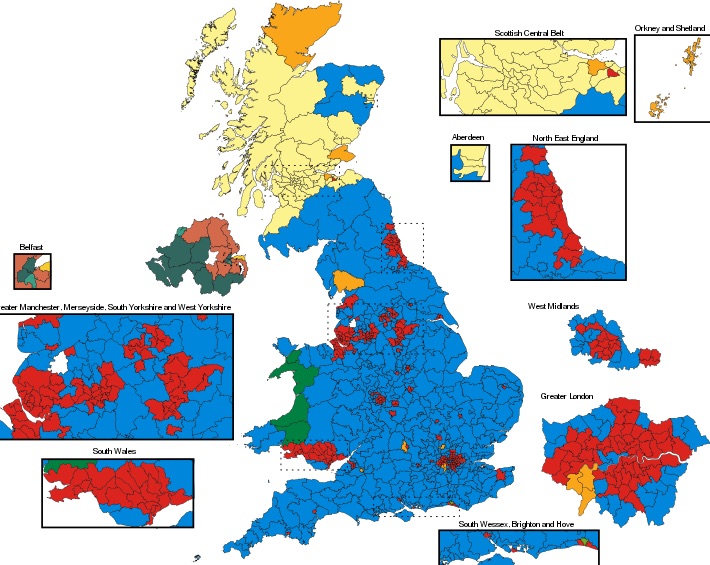
British Election for Dummies: Churchillian Reflections from Afar
…In which an ignorant Yank with a slight remembrance of history ponders the implications. (Friends in Hertfordshire write: “What an election. Let’s hope now we can move on and sort this country out and become Great Britain again.🇬🇧“) Electoral map image reproduced under the Creative Commons-Share Alike 4.0 International license. For a detailed map with results by name or constituency, see Bloomberg News.
Piers Morgan on ardent anti-Brexit actor Hugh Grant:“Hugh’s sorry now. Corbyn’s celebrity fans weep into their almond milk lattes.”
Note: Even Grant approved Johnson’s campaign ad, spun off of Hugh’s charming film “Love Actually.” This must be the best political ad of the year.
Election Impressions…
The first thought that occurs is that a nation whose politicians assured us was fatally divided was not so divided after all. Not at least in the way it voted. The notion of a big rural-urban divide is also suspect, given the vast Tory vote in urban Midlands.
Election polls predicted a Conservative plurality between 45 to 86 over all other parties combined. They ended up with 80. The media predicted as low as a bare majority or a hung Parliament. Some hoped this would allow Labour Party leader Jeremy Corbyn to call in enough chips from the splinter parties to form a coalition. That was the nightmare scenario that caused voters to give Labour its worst beating since 1935. (More about 1935 later.)*
Colo[u]rful Candidates
My favorite Victorian, Jacob Rees-Mogg, was said to be in danger in North East Somerset after an ill-judged remark about the 2017 Grenfell Tower disaster. He netted 28,360 votes, 3000 more than Labour and the Liberal Democrats combined. I hope Prime Minister Johnson feels strong enough to leave JRM Leader of the House of Commons, a dab of colo[u]r amidst the sea of grey.
.
British politics is such fun! In Jeremy Corbyn’s Islington, “Nick the Brick” of the Monster Raving Loony Party got 236 votes. In Uxbridge, Boris Johnson congratulated the MRLP’s Lord Buckethead, who got 125. Alas Ed Balls (Lab.) and Mark Reckless (UKIP) were not running. The formidable grey wolf Dennis Skinner, “Beast of Bolsover,” lost his seat just short of 50 years on the job. We are really going to miss Dennis at his worst, er, best.
Election Anomalies
Labour nearly vanished in Scotland, and ominous patches of Tory blue appeared in the Midlands and Wales, where in some places they hadn’t elected a Conservative for 100 years.
Nigel Farage‘s Brexit Party‘s early bid for seats evaporated as voters came to accept Boris’ proposed EU deal might be as good as it gets, despite much to be negotiated later, like fisheries. But the Brexit Party had enough residual hardline votes to cost Labour wins in some once-safe constituencies. Farage’s decision not to contest Tory constituencies, says The Guardian, was a “monumental” contribution to Johnson’s sweep.
.
Northern Ireland is an indeterminate soup and the DUP unionists lost their leverage. (In the previous Parliament their coalition with the Tories sustained Johnson’s government.) The Scottish National Party didn’t take the 50+ seats predicted but got 48 and dominate Scotland. Voting SNP is a tribal thing in Scotland. It will be so until Scots realize it costs them influence. Mr. Johnson’s opportunity is to convince Scots that getting out of the European Union is better than getting out of the UK. Tall order. A trade deal would help. At least they don’t have to “go to the back of the queue,” per Mr. Obama.
Brexit Implications
Great Britain’s departure from the European Union by the end of January is now virtually certain. But a mandate this big causes the EU to tread more lightly in negotiating Britain’s departure. No longer can they count on a fractured, pro-Remain Parliament to cause a prime minister to come a-begging.
.
Conversely, the landslide vote gives Johnson a better chance to bargain with the fail-safe spectre of a no-deal Brexit. Oooo, scary! That should help him end up with more of what Britain wants and less of what Brussels wants.
* Now about 1935….
In 1935 the Conservatives took 387 seats, comparable to today’s 365. Prime Minister Stanley Baldwin rightly fancied this a mandate. But he wrongly thought he could waffle and bumble and not pay much attention to the people’s business. In the next election—despite the most charismatic prime minister since Disraeli—Labour won 393 seats and the Tories took their worst drubbing in 40 years.
.
That charismatic prime minister was Winston Churchill, who said, “Trust the people.” He also said:







5 thoughts on “British Election for Dummies: Churchillian Reflections from Afar”
Only from the Master of English!
British politics is such fun. Check out this 2017 blind date between Nigel Farage and Boris Johnson’s sister!
Imagine that between Nancy Pelosi and Donald Trump. Inconceivable. Elizabeth Warren and Jim Jordan? Preposterous. Niki Haley and Pete Buttigieg? Well….maybe. Churchillian collegiality still exists in pockets–more over there than over here.
I never thought I would read a sentence that contained both “chortle” and “sloth,” let alone a 5-word sentence! And, a Parliament without “Reckless” and “Balls” defies the the natural order of things. Levity aside, a wonderful take on what it all means!
Great! Informative and highly entertaining.
Thanks so much.
Possibly the best summary I’ve read today. Not too shabby for an ‘ignorant yank’! ;)
Comments are closed.